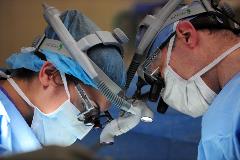Academic and Clinical Excellence

As physicians and scientists, the Division of Neurosurgery faculty brings intellectual curiosity, scientific rigor, and fundamental concern to our patients, our trainees, our colleagues, and the communities we serve in northern New England.
We advance knowledge and innovation, and enhance efficiency through clinical, translational, and biomedical research studies designed to improve the care of patients with neurologic disease. We are dedicated to patient-and family-centric treatment of individuals with neurologic disease, and to developing the next generation of neurosurgical physicians. The UVM Neurosurgery Residency Program if fully accredited by ACGME and committed to training future leaders in the field to be outstanding clinicians, active investigators and experienced educators.